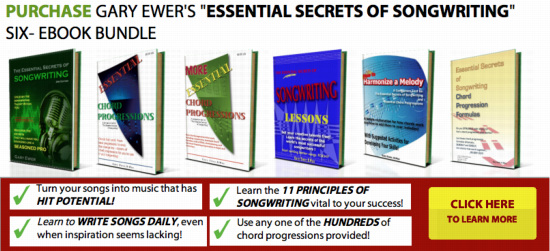Public domain poetry may give you something exciting and distinctive to set for your next song.
______________
You may be writing songs every day, but are you just reinforcing songwriting errors?
Download “The Essential Secrets of Songwriting” 6-ebook bundle, and solve your songwriting problems today.
______________
 The issue of “public domain” usually affects songwriters when it comes to setting lyrics to music. I mentioned this a few posts ago, point #6 in “Copyright, and What it Does For Your Songs.” If you’re looking for a unique approach to providing lyrics for your songs, searching poetry that’s in the public domain can give you something fresh and distinctive.
The issue of “public domain” usually affects songwriters when it comes to setting lyrics to music. I mentioned this a few posts ago, point #6 in “Copyright, and What it Does For Your Songs.” If you’re looking for a unique approach to providing lyrics for your songs, searching poetry that’s in the public domain can give you something fresh and distinctive.
One well-known example of a pop music standard that uses, at least in part, lyrics from a public domain poem is Paul McCartney’s “Golden Slumbers”, based on the poem “Cradle Song” by 17th century poet Thomas Dekker.
In most countries, copyright on intellectual property expires 50 or 75 years after the death of the copyright holder. If the copyright happens to be owned by several people (as is more common in pop songwriting), the copyright expires 50 or 75 years after the death of the last-surviving holder of copyright on that work. So there is a huge treasure trove of poetry that’s there for you to use as your songs’ lyrics.
Related to the issue of public domain is the idea of “fair copy.” This is an implied permission that exists for someone to use a small amount of a work that’s protected by copyright, without having to secure the holder’s permission.
Fair copy, or “fair use,” was a notion that developed as a way for a reviewer to refer to a copyright-protected work as part of their critique. Sentences or paragraphs of a protected work could be reprinted without needing explicit permission.
If you plan to use a small part of an existing song that has the protection of copyright (let’s say, a part of a melody as a sound sample in your own recording), it’s always best to get the explicit permission to use the melodic fragment rather than take any chances. Contrary to a common myth, there is no law that says how much of a copyright-protected work you’re entitled to. The fact, for example, that iTunes plays a 30-second, or 1.5 minute example of a song in its library, is an agreement they have worked out with labels, not guaranteed by law.
The other side of this important issue is that you are entitled to refuse use of even the smallest fragment of your song if someone uses it without your permission, assuming you happen to be the copyright holder. That is what copyright explicitly offers. If your song is published by a company not owned by you, however, you may be out of luck. Generally, publishers of songs acquire the copyright as part of the publishing agreement, and they may license use of your music as they see fit.
_______________
Follow Gary on Twitter










